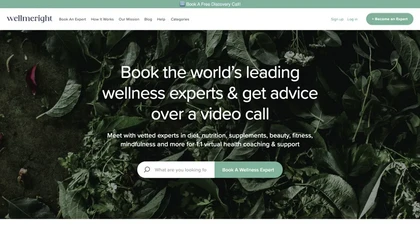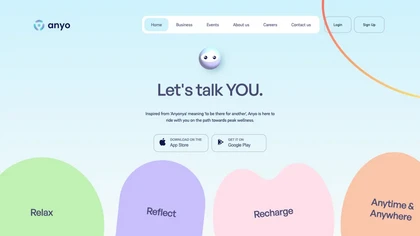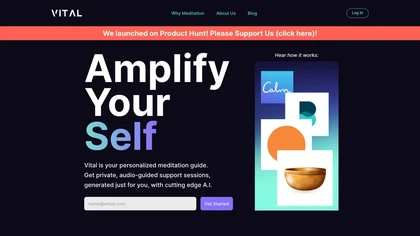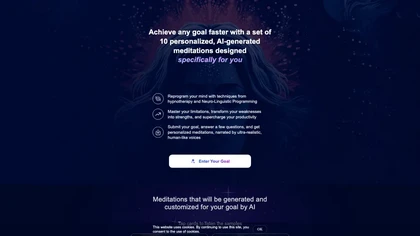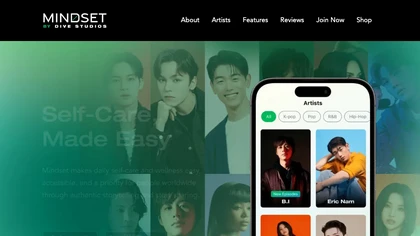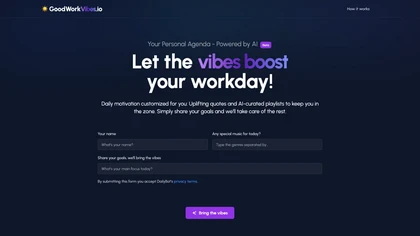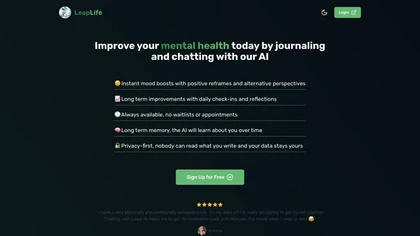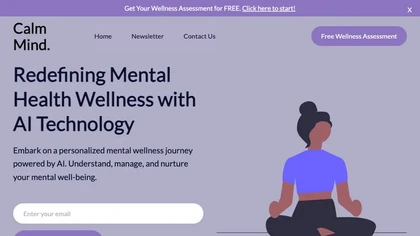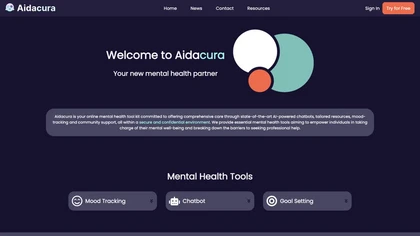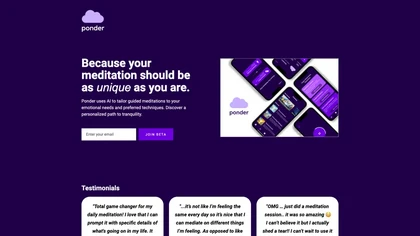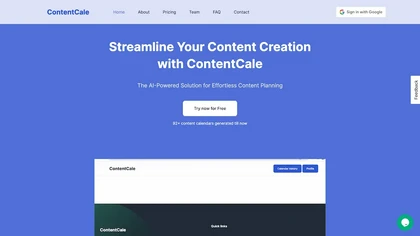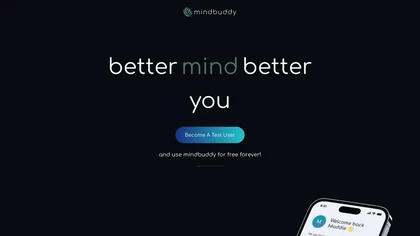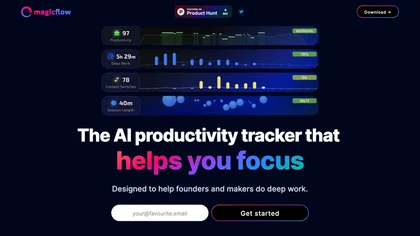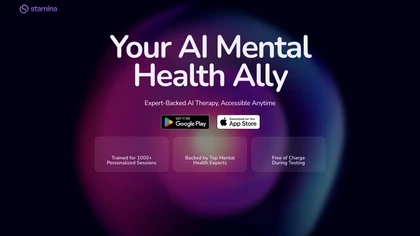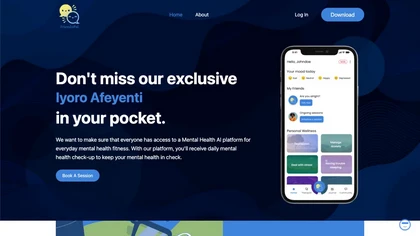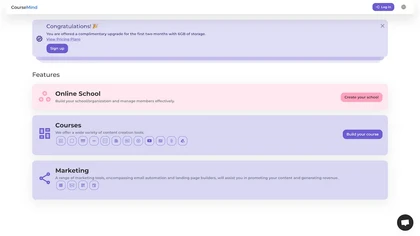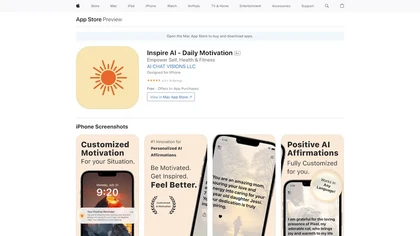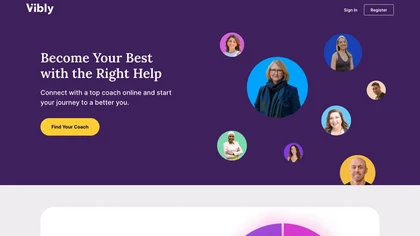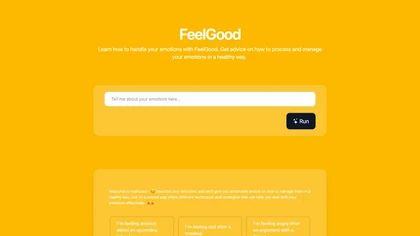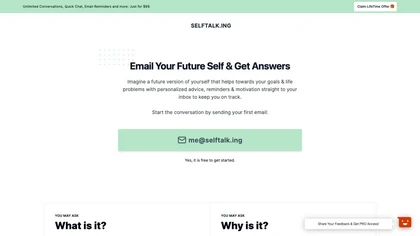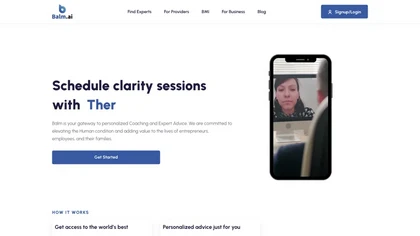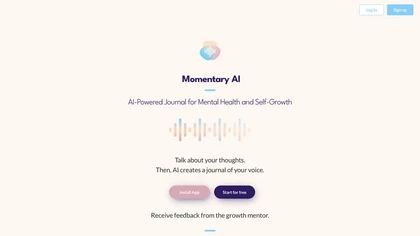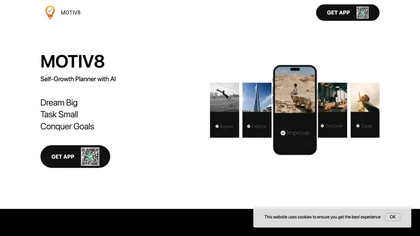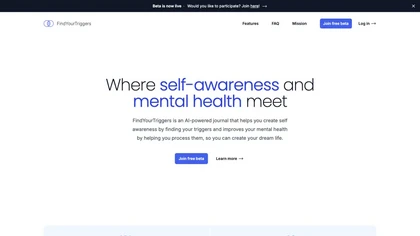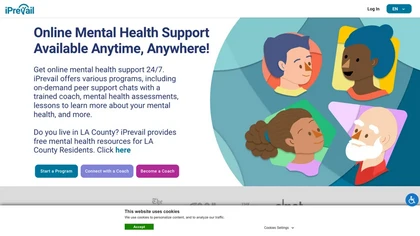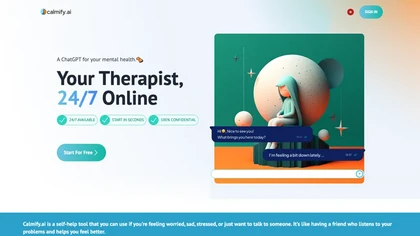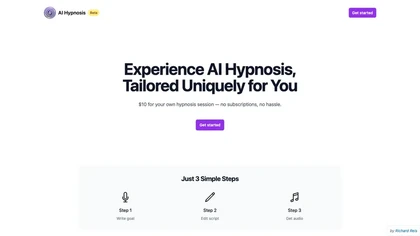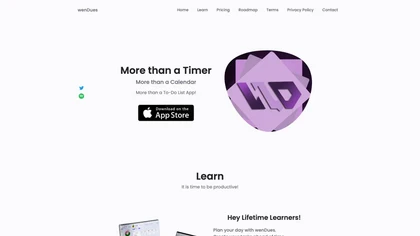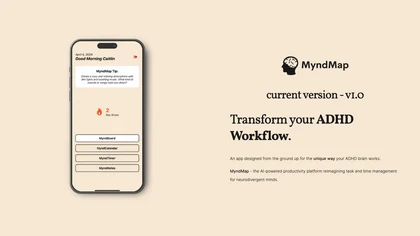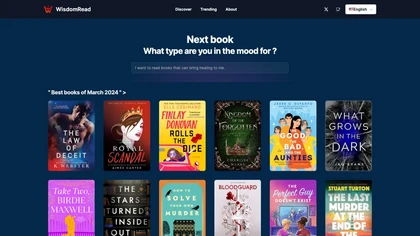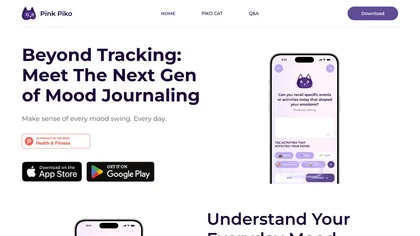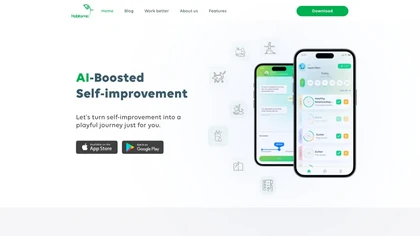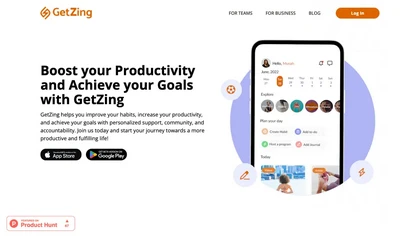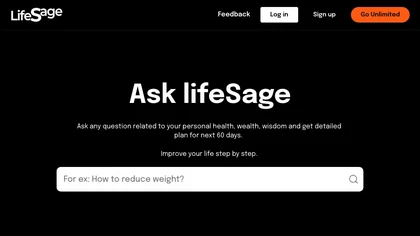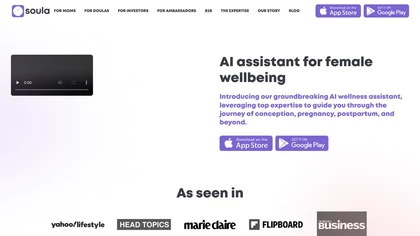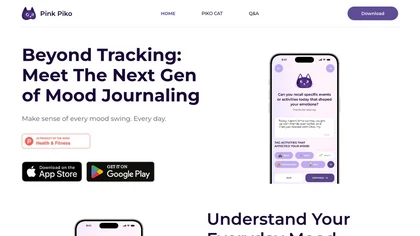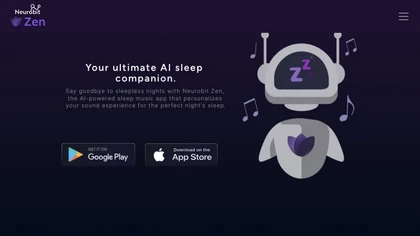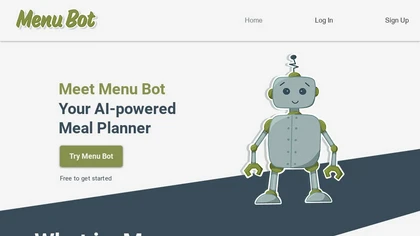AI use cases for Digital well-being
Generative AI can be applied in various applications for digital well-being. Here are some examples to explore below for inspiration with AI tools to get you started with using AI in digital well-being.
🛠️ 70 AI tools for Digital well-being
Explore a dynamic list of some of the most popular tools to get you started with various AI use cases and applications for Digital well-being to streamline your workflows and productivity today.
Well Me Right features
- AI matching and Health Coach capabilities
- Personalized coaching
- Dietary tracking, nutritional guidance
- Guided meditation sessions
- Adaptive health partner
Clearmind features
- To-Do lists
- Mood cards
- Meditation scripts
- Chat
BodyGuru features
- Personalized wellness routines generation
- Tailored recommendations
- Free platform
- Upcoming features integration
- Developed by JBBAE
Anyo features
- Personalized self-care activities
- Resilience building through Carebox
- Real-time connections with listeners
- Seamless booking of therapist appointments
- High-quality content in yoga, psychology, meditation
Vital features
- Personalized audio-guided sessions
- Selection of eight specific meditation techniques
- Six different AI meditation coaches
- Automated email guidance
- Community building through practice comparisons and point system
Neomind features
- Personalized meditations generated by AI
- Utilizes hypnotherapy and neuro-linguistic programming techniques
- Customization based on user's specific goal and needs
- Narrated by ultra-realistic, human-like voices
- Accompanied by a 53-page workbook with science-backed exercises and NLP techniques
MoodPen features
- Real-time reflection
- Personal growth tracking
- Automated journal reflections
- Personalized feedback and suggested actionable steps
- Multi-lingual support
🔥
Create your account, save tools & get personal recommendations
Receive a weekly digest of our handpicked top tools.
Unsubscribe anytime
Dr. FeelGood features
- Personal AI motivational coach
- Human-like understanding
- Powerful motivational capabilities
- Available 24/7
- Coaching sessions anytime needed
Mood AI by Mindset features
- Daily check-ins
- Daily reflections
- Expert advice
- Daily quotes
DayBright: Daily Inspiration features
- Delivers daily wisdom nuggets across various topics
- Allows sharing and saving advice easily
- Provides scientifically backed content
- Offers interactive widgets for quick access to inspirations
- Auto-refresh feature and customizable notification settings
GoodWorkVibes features
- Personalized motivation
- Curated playlists
- Objective setting
- Music genre selection
- Inspirational emails
LeapLife features
- AI chat function
- Personalized chatting AI
- Daily journaling
- AI therapists chat
- End-to-end encryption
CalmMind features
- Wellness assessment
- Calmmind chat
- Curated wellness programs
- Therabot
- Community support
Aidacura features
- AI-powered chatbots
- Tailored resources
- Mood-tracking
- Community support
- Natural language processing
Ponder features
- Tailoring guided meditations to emotional needs
- Personalizing meditations based on current emotions and situation
- Offering flexible meditation options
- Providing structured courses for meditation
- Adapting to support the user's self-discovery and growth journey
ContentCal features
- Generating a content calendar
- Suggesting content ideas
- Creating a content strategy
- Early access subscription
NutritionAI features
- Customized nutrition plans creation
- Tailored meal plans examples
- Focus on privacy and user control
- Installation at home
- Platform login feature for support and queries
mindbuddy app features
- Specially trained chatbot 'buddy'
- Specialization in cognitive behavioral therapy (CBT)
- Personalized guidance through AI
- Track mood and access past chat sessions
- Continuous learning and adaptation capabilities
MealMate
5MealMate features
- Plan meals
- Tailor dietary preferences
- Consider budget
- Adjust for time constraints
Insightful features
- Provide personalized on-demand coaching
- Focus on specific needs
- Available anytime, anywhere
- Blog with latest insights on living a fulfilling life
- Accountability coaching to help young professionals reach full potential
Magicflow.com features
- Live flow timers
- Focus sessions
- Pomodoro timers
- Distraction warnings
- Glowing flow meter
AtFirst features
- Affirmations
- Relaxation sessions
- Self-help guides
- Community feature
- Guided sleep affirmations
Stamina AI features
- Expert-backed AI therapy tool
- Over 1000 personalized sessions
- Cognitive behavioral therapy techniques
- 24/7 availability
- Personalized support from a team of 200+ mental health professionals
FriendnPal features
- virtual one-on-one chats with therapists
- supports various African languages
- booking therapy sessions online
- ASMR sounds for relaxation and stress relief
- digital journal for mood tracking
CourseMind features
- Course creation
- Content creation tools
- Marketing tools
- Email automation
- Landing page builders
Augment AI features
- Keep track of scattered digital life
- Learns and accesses data from various apps
- Automatically saves and summarizes important information
- Creates personalized content
- Anticipates and completes sentences
MyFit AI features
- Program generation
- Meal plan generation
- Saving programs
- Input personal data
Mymealplan features
- Generates personalized meal plans
- Curates a list of the best recipes from the web
- Easy-to-use app
- Caters to various dietary preferences
- Provides grocery list for easy shopping
InspireAI features
- Personalized affirmations
- Motivations for health, fitness, and mindset
- Endless supply of positive mindset quotes
- Smart suggestions
MindwellAI features
- Self-care
- Coping tools
- Journal writing
- Coaching
- Anxiety management program
Vibly features
- AI matching algorithm
- Personalized coach recommendations
- Tailored coaching experience
- Evidence-based techniques
- Convenient online coaching sessions
FeelGood
4.2FeelGood features
- AI-powered
- Emotion analysis
- Actionable advice
- Personalized techniques
- Support emotional well-being
Selftalk.ing
4.9Selftalk.ing features
- Unlimited conversations with future self
- Quick chat interface
- Email reminders
- Personalized advice and motivation
- Access to past conversations
Balm.ai features
- Personalized coaching
- Access to top experts
- 1-on-1 virtual sessions
- Tailored advice
- Convenient expert connection
Momentary features
- AI-powered journaling experience
- Voice-activated journaling
- AI-powered transcribing
- Mood categorization
- Supportive AI mentor
Savor Smart features
- Personalized meal plans
- Consideration of health conditions and dietary restrictions
- Chatbot integration on WhatsApp
- Blood sugar control and weight loss support
- Contextual reminders throughout the day
Motiv8 features
- Goal breakdown into detailed task lists
- Browse trending ideas and ready-to-use task lists
- Seamless task management
- Personalized guidance and recommendations
- Data security and privacy measures
FindYourTriggers features
- AI-powered journal
- Generates prompts based on user input
- Tracks user moods
- Identifies and processes behavior triggers
- Supports a structured three-step plan of assessment, planning, and implementing
Lebenmaster features
- 3-step process for goal forecasting
- Daily progress logs
- Task management functionality
- Brainstats feature
- Support for executing tasks faster and efficiently
MindMeldCanvas AI features
- Content generation
- Fact-checking
- Customized content generation
- Advanced editing options
- Streamlining content creation process
iprevail.com features
- Personalized wellness programs
- User-friendly interface
- Self-help modules
- Therapy sessions
- AI algorithms for progress tracking
calmify.ai features
- AI-powered mental health companion
- 24/7 online support
- Personalized and empathetic assistance
- Employing evidence-based cognitive behavioral therapy (CBT) strategies
- Uses state-of-the-art large language models (LLMs)
Centenarian features
- Personalized sleep coaching
- One-on-one chat with ai sleep coach supercentenarian
- Track biometrics, environment, and progress
- Reminders and recommendations based on ai analysis of sleep data
Mealpractice features
- Recipe generation
- Ingredient selection
- Nutrition style customization
- Protein selection
- Cuisine style selection
6000 thoughts features
- Organize thoughts
- Clarify thinking
- Identify biases
- Achieve breakthroughs
- Self-reflection
Alter features
- Genetic trait analysis
- Personalized fitness plans
- Stress monitoring
- Nutrition guidance based on DNA
- Access to top-tier coaches and wellness advisor
EpicTopia AI features
- Life journey tracking
- AI-generated insights
- Tailored action plans
- Personalized chronicle on a timeline
- Detailed guidance
AI Meal Planner features
- Generates personalized meal and workout plans
- Includes fitness chatbot support
- Provides recipes
- Tailored to user's goals and needs
- Pricing options available
AI Hypnosis App features
- Customized hypnosis sessions tailored to individual goals
- Ability to input goals and edit scripts for personalized audio files
- Utilizes OpenAI Elevenlabs for audio generation
- Secure transactions through leading financial service Stripe
- No subscriptions, just a one-time payment for tailored sessions
GetZingAI features
- Personalized habit management tool
- Curated challenges and programs
- Reflection feature for journaling
- Integration with productivity tools
- Community and accountability features
wenDues features
- Task creation
- Goal setting
- Subtask breakdown
- Timer integration
- Music player with unique soothing melodies
MyndMap features
- AI-powered productivity platform
- Centralized hub for productivity needs
- Integration of tasks, calendar, timer, and notes
- Color-coded priority levels for better focus
- Personalized insights through AI analysis
MealPlanner features
- Personalized meal planning
- Tailored meal plans based on dietary restrictions
- Customized meal plans based on personal taste and preference
- In-app shopping list feature
- Step-by-step cooking instructions
WisdomRead features
- Personalized book recommendations
- Matching books to current mood
- Wide array of book genres
- Recommendations for specific time periods
- Transmuting words into wisdom
Pink Piko features
- Interactive tracking experience
- Insightful questions for emotional reflection
- AI-powered technology for interpreting mood logs
- Personalized emotional insights
- Transforms emotional data into tangible insights
Nutrition Assistant features
- dietary advice support
- intolerance support
- recipe suggestions
- nutritional goal assistance
- personalized nutrition guidance
Habitomic features
- Personal Assistant Chatbot (Mana)
- Pool of Habits & Mini habits customization
- Life-Changing Insights and Peer Introductions
- Sharp Habit Scheduler with personalized reminders
- Insightful Habit Analyzer with streak tracking and achievements
GetZing features
- Personalized support
- Curated challenges and programs tailored to individual needs and interests
- Habit management
- AI-powered scheduling recommendations
- Data security focus
Lifesage features
- Health
- Wealth
- Wisdom
- Personal development
- Self-improvement
Lily features
- Voice-activated AI
- Personalized guidance for mental health
- Support for anxiety, stress, self-esteem
- Digital wellness guide
- Privacy and tailored support
FoodZilla.io features
- Recipe builder
- Meal planning system
- Nutrition reports
- Mobile app
- Secure messaging
HeartDialog features
- 24/7 availability
- Personalized conversations
- Privacy protection
- Context tracking
- Integration of journaling, meditation, and CBT
Soula Care features
- Personalized AI-based chatbot
- Evidence-based and structured content
- Holistic pregnancy planner and tracker
- Mental health support
- Access to top experts in the field
Eat Smart features
- Personalized diet plans
- Customization based on weight, height, age, and weight loss goals
- Consideration of country of residence for local cuisines
- Biologically relevant dietary recommendations
- Free AI tool
Mealmind features
- Generate personalized meal plans
- Interactive shopping lists
- Tailored to individual dietary requirements
- Food preferences
- Fitness goals
- Simplify grocery shopping
- Provide step-by-step instructions for cooking
- Variety of diets
Sixty features
- Prioritization of to-do list
- Inbox management
- Appointment scheduling
- Agenda creation
- Reminder system
PinkPiko features
- Mood tracking
- Interactive experience
- Insightful questions
- Personalized emotional insights
- Actionable insights
Neurobit features
- Personalizes sound experience
- Curated selection of relaxing audio
- Artificial intelligence to generate audios
- Customizable options
- Promotes calmness
Menubot features
MyMind features
- Save content
- Organize content
- Retrieve content
- Tag content
- Privacy
